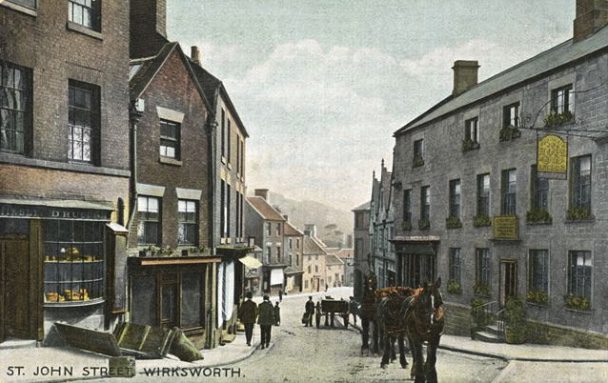
Until 1841, no registration was needed for chemists and druggists, as pharmacists were known at the time. Then regulation began to creep in. The Pharmacy Act 1868 set up a register of people qualified to sell, dispense and compound poisons. The Pharmaceutical Society began to examine and register pharmacists and prosecute them in cases relating to poisons. Pharmacy premises were not registered until 1936. As a result the chemists and druggists who worked in Wirksworth in the 18th, 19th and early 20th centuries can best be found from the trade directories, parish records and census. Not all chemist shops were primarily pharmacies, many provided other services and goods, as do many chemists today.
Before there were pharmacists, there were apothecaries, chymists, druggists. Apothecaries in the 17th, 18th and 19th centuries must pass the examination of the Worshipful Society of Apothecaries. They supplied some medicines within their broader healthcare role. No apothecaries are recorded in Wirksworth in the early directories.
In the earliest directory of 1791, there were no chemists and druggists listed in Wirksworth.
The first mention is in the 1828 directory, which lists William Frost and Thomas Tomlinson as Wirksworth chemists and druggists. The 1831 Pigot’s Directory of Derbyshire, listed druggists, Joshua Ford, William Frost and Alexander James, all three trading in the Market Place. By 1857 (White’s Directory), William Frost was still in business and Joseph Marsh had set up as druggist on the Market Place. The 1895 Bulmer’s Directory records the first chemists as James Hindle and Michael Mason, both trading on the Market Place.
Business directories dated between 1821 and 1846 also mention John Evans and Joshua Ford, each described as chemist and druggist, grocer and tea dealer at Wirksworth Causeway and Market Place respectively.
The 1897 Census lists Michael Mason, chemist and druggist, at 12 Market Place, which later became the Co-op and more recently Sour Cow café. Mason also worked at Babington House during its years as a cottage hospital sometime between 1867 and 1927.
B. Payne & Son, Dispensing Chemists
Since 1933, the Payne family have served Wirksworth residents for several generations, Benjamin, John and Nicholas Payne. Payne’s at 24 Market Place is in a recognisably venerable building and displays historic pharmacy furnishings, bottles and jars inside.
This building was first described as a pharmacy in 1756, when it was owned by Mr Hall. The double bow fronted windows are believed to be 1756 originals. There is very little information about the premises at that time, or indeed who the Hall family was. However, chemist and druggist Thomas Tomlinson married a Mary Hall in 1821. His business was variously described in directories between 1821 and 1846 as druggist, ironmonger, glass warehouse, perfumer.
James Hindle, chemist and oil merchant, took over the premises sometime between 1857 and 1895. His son Robert Hindle inherited it and is described in the 1901 Census as a chemist and druggist. Hubert Hindle, brother of James and uncle to Rob, who was involved with mineral water manufacturing at the Coldwell Works, according to the 1895 Bulmers Directory.
Benjamin Payne bought the shop in 1935, having initially worked from 13 St John Street, the Balti takeaway in 2020. The business was run by Benjamin, his son John, and then John’s son Nicholas. In the 21st century, a satellite pharmacy opened at Hannage Brook Medical Centre, and closed again in 2019.
Payne’s is still very much a pillar of Wirksworth community and continues to provide essential service throughout the Covid-19 crisis of 2020.

